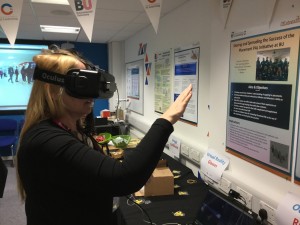Our Research and Knowledge Exchange team just held a public engagement training session led by Steve Dorney. Steve heads up the University of Southampton’s Public Engagement with Research Unit. In the session Steve his expertise to support a mix of BU academics and research students from a whole host of disciplines to know more about public engagement and to find ways to embed engagement into research.
What is public engagement ?
The National Coordinating Centre for Public Engagement defines it as follows:
“Public engagement describes the myriad of ways in which the activity and benefits of higher education and research can be shared with the public. Engagement is by definition a two-way process, involving interaction and listening, with the goal of generating mutual benefit.”
Research Councils UK emphasise the importance of building “reflexive and responsive research communities” where public voices and experiences are listened to and shape research strategy.
It can involve the general public, schools, museums, galleries, business, trade or third sector partners, or policymakers.
Why it matters for your research:
Public engagement is not going away.
Engaging the public in the development and dissemination of your research is vital for economic and ethical reasons. But it is also fun and can shape your research in unexpected and creative ways.
Looking forward to REF 2020, ensuring that your research has a sustained and engaging narrative is a critical to demonstrating the impact of your research.
Here are some more benefits of engagement.
Ways to engage:
Talking about your research can be difficult. It can be hard to find the words to share complex ideas and findings with non-specialist audiences.
Because academic disciplines have such specialised language and ways of working it can be difficult to find a common language when working in multi-disciplinary teams and with external stakeholders.
Listening to the public and to stakeholders and learning together can both shape new research and support more accessible and inclusive ways of working. It can help develop your innovative pedagogical practice.
There is no one way to engage. Engagement takes many forms, from talks and one of events to ongoing relationships with the public and stakeholders.
People have an appetite for knowledge. They are curious about things that happen in universities.
Here are some possible ideas for engagement:
- Public-facing events like the Festival of Learning
- Exciting events like CELebrate 2016 this week
- ‘Curiosity Magnets’ – things that draw people off the street – can become ways to draw people into to more focused discussions about your research.
- Researcher cafes/pubs can act as self-sustaining ‘speed-dating’ for your research
- Research Roadshows at festivals and public events can be a good way to quickly reach a large and diverse audience and ‘spark’ ideas and more lasting relationships.
- Creatively using blogs can build relationships and share findings
- The NCCPE run the Engage Awards showcasing the best work in the sector– it is important to celebrate your work!
Sometimes public engagement can be serendipitous – it can happen organically and in ways that can’t be predicted. Embedding serendipity into your research strategy and building a focused narrative of these relationships can help shape a compelling impact case study.
Public engagement is a two-way street; it is engagement, it is a relationship and it can change your research for the better!








